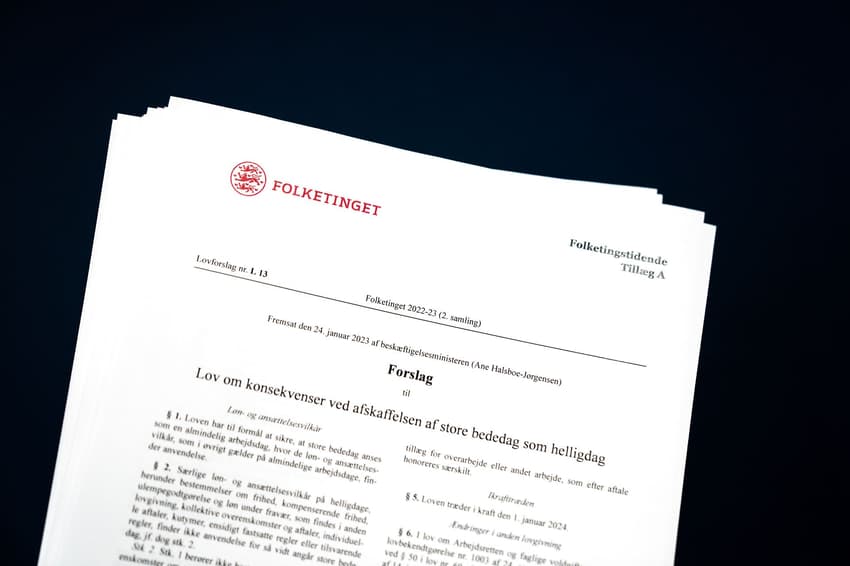Danish economists say abolition of Great Prayer Day is ‘not necessary’

Leading economists in Denmark say that scrapping the Great Prayer Day holiday is not a necessary measure and that the potential economic benefits for the state are dubious.
Three economists writing in a column in political media Altinget said there was “nothing necessary” about the plan to scrap Great prayer Day.
“Is it better, then, to cancel the government’s planned tax cuts, to cut public spending or to use the opposition’s alternative proposal?”, write the three economists: Ulrik Beck, senior economist with thinktank Kraka; and Michael Svarer and Hans Jørgen Whitta-Jacobsen, professors in economics at Aarhus and Aalborg universities respectively and both former members of the Danish Economic Councils.
The three economists go on to write that the answer to the question comes down to preferences and priorities.
They state that an opposition plan to raise an annual three billion kroner, the amount the government says the Finance Ministry will raise by scrapping Great Prayer Day, is “a fraction better”.
The three governing parties – the Social Democrats, Liberals (Venstre) and Moderates – want to abolish springtime public holiday Great Prayer Day in a move they say will enable increased defence spending to meet Nato targets by 2030, three years ahead of the current schedule. A bill was tabled by the government earlier in January.
The policy has met with criticism from trade unions, the church and opposition parties, while the military itself has also distanced itself from the plan.
READ ALSO:
- Why does Denmark have an annual ‘Prayer Day’ holiday?
- Denmark formalises plan to abolish public holiday
- Danish opposition parties offer defence spending plan to save public holiday
In an alternative proposal, the nine opposition parties say they can raise the money by diverting 1.25 billion kroner from the public investment budget, 1 billion kroner from a winter assistance programme which the parties say was over-financed, and savings on business support spending of 0.75 billion kroner.
The three economists write that the opposition proposal could hold back the welfare system in future, however. Additionally, a reduction in business support could harm companies.
Regarding the economic effect of scrapping Great Prayer Day, they state that although this has a potential monetary benefit, it is uncertain.
That is because people working in Denmark could choose to adjust their working hours by taking less overtime or “hours of interest” (interessetimer), they state.
In addition, collective bargaining agreements between trade unions and employers could eventually provide for an extra day off in response to emerging demand for this.
That would negate the effect of scrapping the holiday, the experts said.
READ ALSO: What is a Danish collective bargaining agreement?
Comments
See Also
Three economists writing in a column in political media Altinget said there was “nothing necessary” about the plan to scrap Great prayer Day.
“Is it better, then, to cancel the government’s planned tax cuts, to cut public spending or to use the opposition’s alternative proposal?”, write the three economists: Ulrik Beck, senior economist with thinktank Kraka; and Michael Svarer and Hans Jørgen Whitta-Jacobsen, professors in economics at Aarhus and Aalborg universities respectively and both former members of the Danish Economic Councils.
The three economists go on to write that the answer to the question comes down to preferences and priorities.
They state that an opposition plan to raise an annual three billion kroner, the amount the government says the Finance Ministry will raise by scrapping Great Prayer Day, is “a fraction better”.
The three governing parties – the Social Democrats, Liberals (Venstre) and Moderates – want to abolish springtime public holiday Great Prayer Day in a move they say will enable increased defence spending to meet Nato targets by 2030, three years ahead of the current schedule. A bill was tabled by the government earlier in January.
The policy has met with criticism from trade unions, the church and opposition parties, while the military itself has also distanced itself from the plan.
READ ALSO:
- Why does Denmark have an annual ‘Prayer Day’ holiday?
- Denmark formalises plan to abolish public holiday
- Danish opposition parties offer defence spending plan to save public holiday
In an alternative proposal, the nine opposition parties say they can raise the money by diverting 1.25 billion kroner from the public investment budget, 1 billion kroner from a winter assistance programme which the parties say was over-financed, and savings on business support spending of 0.75 billion kroner.
The three economists write that the opposition proposal could hold back the welfare system in future, however. Additionally, a reduction in business support could harm companies.
Regarding the economic effect of scrapping Great Prayer Day, they state that although this has a potential monetary benefit, it is uncertain.
That is because people working in Denmark could choose to adjust their working hours by taking less overtime or “hours of interest” (interessetimer), they state.
In addition, collective bargaining agreements between trade unions and employers could eventually provide for an extra day off in response to emerging demand for this.
That would negate the effect of scrapping the holiday, the experts said.
READ ALSO: What is a Danish collective bargaining agreement?
Join the conversation in our comments section below. Share your own views and experience and if you have a question or suggestion for our journalists then email us at [email protected].
Please keep comments civil, constructive and on topic – and make sure to read our terms of use before getting involved.
Please log in here to leave a comment.